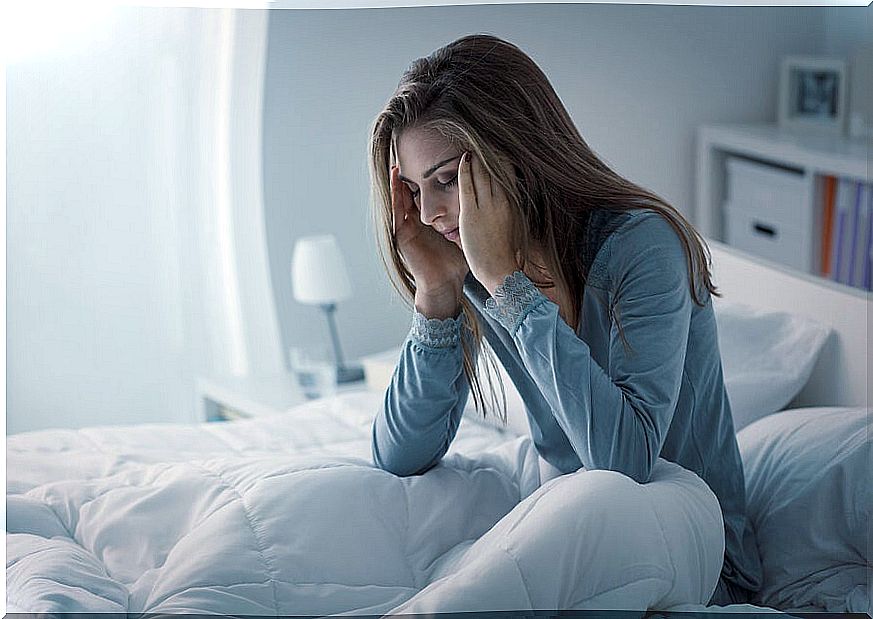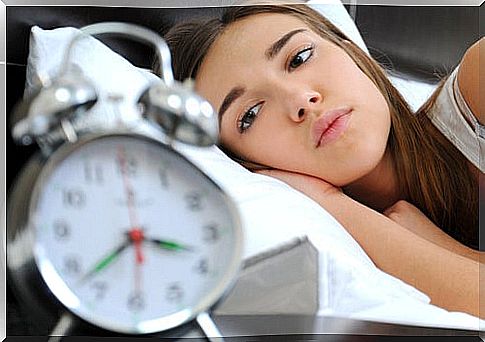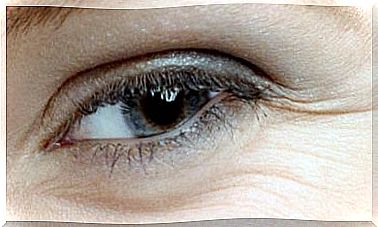The Menstrual Cycle And Sleep
Varying the amount of female hormones regulates the menstrual cycle and has an effect on sleep. Before ovulation there is an increase in estradiol synthesis that has been linked to increased REM sleep.
After ovulation, progesterone synthesis increases, which is responsible for the feeling of drowsiness that many women suffer at that time of the cycle.
Hormonal behavior, quality and quantity of sleep vary according to the period of the menstrual cycle in which the woman is. We are going to study each of the parts of the menstrual cycle and its relationship to sleep separately.
Premenstrual period and sleep
In this phase of the menstrual cycle, sleep is affected by the consequences of increased estradiol synthesis, which have various effects on an emotional level.
It interacts with various brain regions such as the bulb, the hypothalamus, the prefrontal lobes and the amygdala, and is responsible for many of the effects on the emotional universe of women during the premenstrual phase of the cycle.
We will analyze below what happens just before menstruation when estradiol levels are high:
- Irritability.
- Humor changes.
- Sadness.
- Anxiety.
- Social isolation.
- Depression.
- Insomnia.

Sleep disorders, which occur in this phase, are usually attributed to increased levels of cortisol and adrenaline, which are the generators of stress.
Stress affects sleep in different ways. The woman in the premenstrual period may have difficulty conciliating it, waking up throughout the night or waking up feeling tired.
It is convenient in the premenstrual period to carry out activities that contribute to stress management such as yoga and meditation that usually improve the quantity and quality of sleep.
Menstrual period and sleep
During the menstrual period, estradiol levels decrease and progesterone levels increase. By decreasing the estradiol rate, the sleep-wake rhythm is usually normalized, although in cases of underlying diseases, such as depression and anxiety, sleep disorders may persist. In this case, they are attributable to disorders in the psychological sphere and not to estradiol levels.
Progesterone begins to be synthesized at the time of ovulation and is responsible for preparing the endometrium to host the future embryo and for the maintenance of pregnancy in the event that it occurs.
In the menstrual cycle, progesterone produces hormonal changes that can affect sleep. It is responsible for the synthesis of gamma- aminobutyric acid (GABA), which has several antagonistic effects to estradiol.

For example, it modulates impatience, mood swings, reduces distress, and improves stress management. Some research in this regard considers progesterone as a natural anxiolytic, such as that published in the journal Neuropharmacology in 2005.
- Decrease anxiety.
- Relieves symptoms of depression.
- Improves the emotional state.
- Reduce stress.
- Causes drowsiness.
Thus, these effects, together, explain the improvement in sleep-wake rhythm and the increase in the quantity and quality of sleep after menstruation. Although there may be factors that alter it as consequences of headaches, gastric and digestive discomfort, and so on.
In any case, we must observe the menstrual cycle and sleep to detect the alterations that occur every 28 days in the latter.
Measures to improve sleep in the menstrual cycle
Although the best thing to do with sleep problems is to go to the doctor for help, there are some recommendations we can give you in this regard:
- Do not consume exciting afternoon or evening, such as chocolate, coffee, tea, alcohol and tobacco.
- Eat a small meal and wait at least two hours before going to bed.
- Light physical exercise, avoiding the last hours of the day, since the opposite effect is achieved.
- Do not take prolonged naps that alter sleep or wakefulness. Maximum 30 minutes.
- Maintain regular bedtime and wake-up times. Regular meal times are also important.
- Avoid exposure to strong light and extreme temperatures in the bedroom.
- Tasks that require mental activity should not be done in the bedroom, such as using the computer, tablet, mobile phone, TV, etc.
- It can help, before going to sleep, listening to relaxing music, a warm shower or meditating.
As we can see, female hormones vary throughout the menstrual cycle and have various effects on sleep. It is good to know the relationship of different hormones with the menstrual cycle and sleep in order to take measures that improve their quality, our rest and well-being in general.









